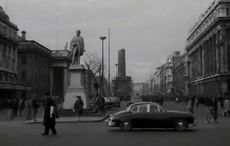Wacky Eire
By Geraldine Comiskey
Ireland is the acknowledged home of surrealism and Geraldine Comiskey (a roving reporter for the Sunday World) often has occasion to encounter it at its source.
Having a journalistic resume that includes getting set on fire by stuntmen, dancing on the wings of a World War II bi-plane (well, who hasn’t?) and joining a circus trapeze troupe, she’s clearly ready for anything.
Ireland in Comiskey’s book is a magical place where all manner of weirdness awaits you down almost very boreen, so in a way her job is an ideal one, scouring the nation in search of fun.
Her book is an eye-popping procession of dodgy faith healers, rural swingers, ghost hunters, GAA players, all of Irish life really. Gifted with a never say die spirit and an uncanny ability to find herself at the center of the wackiest stories, she’s an ideal guide to the books theme and this is one of the moist singular books of its kind you’re ever likely to read about its subject.
Dufour, $22.95.
Fever
Mary Mallon was called a lot of things in her time, but she is known best to history as Typhoid Mary. It was an unfortunate moniker for the poor Irish immigrant woman who had traveled on her own to a new life in America, where she was to discover many new things about herself. Among the most employable discoveries she made was her remarkable talent for cooking.
In Mary Beth Keane’s new novel, Mallon’s life is imaginatively recreated in an act that seems determined to rescue her demonized subject from history. The writer looks behind the headlines to the individual life and the struggles Mallon contended with.
Working as a cook in upper class kitchens, Mallon unwittingly infected multiple people with typhoid, which eventually led to the discovery that there could be such a thing as an “asymptomatic carrier” (a person who carried the disease without becoming infected with it).
In order to contain an outbreak, Mallon was sent by the Department of Health to North Border Island, where she was held in quarantine from 1907 to 1910.
Along the way she became a legend, and this book seeks to rescue her from the headlines by reminding us that she was also a person, not simply a carrier of disease. Keane has crafted a remarkable narrative from a fascinating and ultimately heartbreaking tale.
Scribner, $26.
Lola’s Secret
By Monica McInerney
If you have grown up in a feuding family (and if you’re Irish that more of a certainty than not) the last thing you’d want is for some do-gooder relative to concoct stratagems to bring you and your warring relations to the same table.
But in Lola’s Secret, by bestselling Dublin based author Monica McInerney, the heroine can’t help herself. At 84 she’s still determined to exercise her talent for creating truces among long battling families.
Her latest scheme involves inviting a number of mystery guests to stay at a local hotel – guests who have their reasons not to spend Christmas with their loved ones.
If this sounds contrived, well it is, but it is also effective too. And the woman who breaks her heart to make everything right for other people discovers that she’s not above experiencing a little healing of her own. McInerney’s addresses the occasional stuckness and the obstinance of family dynamics and she reveals just how much can change for better with a little push.
Ballantine, $15.
Smashing H-Block
By F. Stuart Ross
H-Block. Even the name is like a talisman that takes you right back to the darkest days of The Troubles in the North. In F. Stuart Ross’s study he offers a political history of the Irish Republican struggle against criminalization from 1976 to 1982.
These men were not terrorists. They were soldiers defying an occupation, and their struggle eventually culminated in the hunger strikes that were a turning point in the long war.
Ross insists that it was not just the prisoners themselves but also the wider activism of the grassroots movement outside the prisons that reshaped the Republican struggle and revitalized its ambitions.
Ross is a Derry based academic who reminds us that through their political activism ordinary people, the friends and relations of those “inside” had a profound effect on the emerging political consensus that was built during the darkest years of The Troubles and would change the debate thereafter.
University of Chicago Press, $34.95.
By Geraldine Comiskey
Ireland is the acknowledged home of surrealism and Geraldine Comiskey (a roving reporter for the Sunday World) often has occasion to encounter it at its source.
Having a journalistic resume that includes getting set on fire by stuntmen, dancing on the wings of a World War II bi-plane (well, who hasn’t?) and joining a circus trapeze troupe, she’s clearly ready for anything.
Ireland in Comiskey’s book is a magical place where all manner of weirdness awaits you down almost very boreen, so in a way her job is an ideal one, scouring the nation in search of fun.
Her book is an eye-popping procession of dodgy faith healers, rural swingers, ghost hunters, GAA players, all of Irish life really. Gifted with a never say die spirit and an uncanny ability to find herself at the center of the wackiest stories, she’s an ideal guide to the books theme and this is one of the moist singular books of its kind you’re ever likely to read about its subject.
Dufour, $22.95.
Fever
Mary Mallon was called a lot of things in her time, but she is known best to history as Typhoid Mary. It was an unfortunate moniker for the poor Irish immigrant woman who had traveled on her own to a new life in America, where she was to discover many new things about herself. Among the most employable discoveries she made was her remarkable talent for cooking.
In Mary Beth Keane’s new novel, Mallon’s life is imaginatively recreated in an act that seems determined to rescue her demonized subject from history. The writer looks behind the headlines to the individual life and the struggles Mallon contended with.
Working as a cook in upper class kitchens, Mallon unwittingly infected multiple people with typhoid, which eventually led to the discovery that there could be such a thing as an “asymptomatic carrier” (a person who carried the disease without becoming infected with it).
In order to contain an outbreak, Mallon was sent by the Department of Health to North Border Island, where she was held in quarantine from 1907 to 1910.
Along the way she became a legend, and this book seeks to rescue her from the headlines by reminding us that she was also a person, not simply a carrier of disease. Keane has crafted a remarkable narrative from a fascinating and ultimately heartbreaking tale.
Scribner, $26.
Lola’s Secret
By Monica McInerney
If you have grown up in a feuding family (and if you’re Irish that more of a certainty than not) the last thing you’d want is for some do-gooder relative to concoct stratagems to bring you and your warring relations to the same table.
But in Lola’s Secret, by bestselling Dublin based author Monica McInerney, the heroine can’t help herself. At 84 she’s still determined to exercise her talent for creating truces among long battling families.
Her latest scheme involves inviting a number of mystery guests to stay at a local hotel – guests who have their reasons not to spend Christmas with their loved ones.
If this sounds contrived, well it is, but it is also effective too. And the woman who breaks her heart to make everything right for other people discovers that she’s not above experiencing a little healing of her own. McInerney’s addresses the occasional stuckness and the obstinance of family dynamics and she reveals just how much can change for better with a little push.
Ballantine, $15.
Smashing H-Block
By F. Stuart Ross
H-Block. Even the name is like a talisman that takes you right back to the darkest days of The Troubles in the North. In F. Stuart Ross’s study he offers a political history of the Irish Republican struggle against criminalization from 1976 to 1982.
These men were not terrorists. They were soldiers defying an occupation, and their struggle eventually culminated in the hunger strikes that were a turning point in the long war.
Ross insists that it was not just the prisoners themselves but also the wider activism of the grassroots movement outside the prisons that reshaped the Republican struggle and revitalized its ambitions.
Ross is a Derry based academic who reminds us that through their political activism ordinary people, the friends and relations of those “inside” had a profound effect on the emerging political consensus that was built during the darkest years of The Troubles and would change the debate thereafter.
University of Chicago Press, $34.95.




Comments